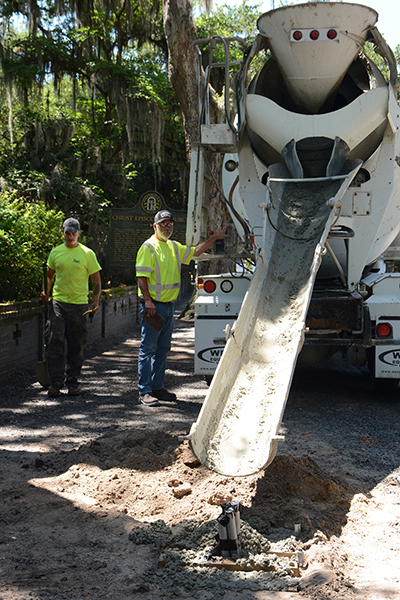This week will bring a long awaited arrival. By Friday we will finally have our

crossing device installed in front of Christ Church to help us safely cross the road from our parking area. It’s taken more than two years of patient work with the County to get it approved. (Thank you to Mthr. Becky Rowell who knows how to speak “County!”) We started investigating it in response to the concern some parishioners felt about crossing the road safely, given that our entrance falls between two blind curves. Our Sunday morning officer was envisioned as a short-term solution, although that presence has continued for as long as it has taken to bring this process to its conclusion.
The crossing device will bring added safety to crossing Frederica Road at all hours of the day and night, not just on Sunday mornings. We will now have crossing assistance for midweek events, day and night, as well as for all of our tourists and visitors. In addition, the poles that are being installed will provide extra lighting at night as well. We will phase out the off duty police officer in the coming weeks, which

has always been the plan. The police presence is not inexpensive; especially when we realize it’s only there for a few hours a week. We are so very grateful to our regular officer who has taken such care to help us cross the road over these years, and we will find a way to recognize him in our liturgies before we say goodbye.
As I thought about the installation of this device and the safety we seek in crossing the street, it reminded me of a modern day parable from a Scottish priest by the name of Tom Gordon. His story captured my attention, especially as the father of two little girls. I have a feeling it will grab some of you, too. I used it in a sermon years ago and dug it up to share it today.
Jenny always held her mother’s hand when she was crossing the road, even when the ‘[white] man’ was showing that traffic had stopped [and it was safe to cross]. Her mother insisted. ‘Hold my hand, [dear]. It’s a busy road. Come now! Take my hand. Then you’ll be safe.’ Well, it’s what grown-ups do, isn’t it? So, for every busy road, and even for the quieter ones near her house, it was the same. ‘Hold my hand, Jenny. There’s a road to cross.’ So Jenny, dutifully, held her mother’s hand when she was crossing the road.
It almost went disastrously wrong at the [crosswalk] outside the supermarket. Jenny had been helping her [mom] with the shopping – something she always enjoyed. And so a careful mother, with a full shopping bag in one hand and the other hand available for a dutiful child to hold on to, stood at the cross[walk] waiting for the lights to change so that she and Jenny could pop into the news[stand] on the way home. Jenny had a ball in her other hand. Nothing unusual about that, as Jenny and her favorite ball were largely inseparable. And so you had to hold your mother’s hand and grip your ball tightly as you crossed the road.
The lights changed. The traffic stopped. The ‘orange [hand]’ changed to ‘[white man]’. And Jenny and her [mom] set off to cross the road. And that’s when Jenny dropped her ball. In an instant, the ball was out of her fingers and was running under the wheels of a stationary car waiting on the green light. Jenny’s precious ball ... And in a split-second, Jenny had let go of her mother’s hand and was off after the ball. ‘Jenny!’ her mother screamed, and turned to catch her daughter.
Just at that moment, a cyclist came careening down the road. Assuming there was no one in the cross[walk],

and unable to see the developing crisis, the cyclist jumped the changing light, saw Jenny [at the last second], braked suddenly to avoid hitting her, swerved violently, and ran straight over the bag of [groceries] that Jenny’s [mom] had dropped in the middle of the cross[walk] in her attempt to rescue her child.
Thankfully, no one was hurt. The cyclist just managed to stay upright. Jenny was whisked across the road by a scared and relieved mother. And there were broken eggs, squashed tomatoes, slices of bread, and the remains of a day’s shopping scattered all over the street. As the shaking cyclist was being [scolded] by angry pedestrians and drivers alike, a bewildered Jenny was being [scolded] by an angry mother. ‘I told you that you always have to hold my hand. You’re more important than a silly ball. It’s too dangerous to cross by yourself. You have to hold my hand, right?’ Jenny nodded through her tears. A lesson had been learned. Holding your mother’s hand would always keep you safe.
[Later that week] when Mrs. Robertson from next door, [who Jenny knew affectionately as Granny Robertson], invited Jenny to come to the store with her – with Jenny’s mother’s approval, of course – Jenny told Granny Robertson the whole story of the cross[walk] and the cyclist – including how she’d rescued her precious ball at the end of it all which was, of course, very important. ‘I have to hold your hand when I’m crossing the road, Granny Robertson,’ she insisted on their way to the shops, ‘because that way I’ll always be safe.’
Granny Robertson just said ‘Oh,’ as the conversation went on to other things. That is, until they were approaching the cross[walk] in front of the supermarket, and Granny Robertson insisted, ‘Now, Jenny. Here we are, about to cross the road. You want to be safe from danger? Then, come, and I’ll hold your hand while we cross.’ Jenny paused. It sounded the same as her [mom] had said, but ... then ... it was kind of different. But, dutifully, Jenny held out her hand to take hold of Granny Robertson’s, just as she did with her [mom].
But as their fingers touched, before Jenny could grip on to Granny’s Robertson’s hand, the old lady took Jenny’s hand firmly in hers. Now, not only didn’t it sound right, but it didn’t feel right either. ‘But ...’Jenny began. ‘What’s the matter?’ Granny Robertson enquired, the flicker of a smile appearing on her face. ‘But ...’ Jenny stammered on, ‘when we cross the road, I hold on to my [mom]’s hand. She doesn’t hold on to mine.’ ‘Ah. I know that. But you see, if you hold on to mine, no matter how hard you try and grip tight, you’ll always be distracted, and your attention will wander...’‘Like dropping my ball, you mean.’ ‘Exactly. Like dropping your ball. And you’ll let go, and then you’ll be in danger...’ ‘From cyclists...’ ‘From cyclists, and cars, and much more besides. But, you see, when I hold on to your hand, [I won’t] let go. Because my hand is bigger than yours. No matter how much you get distracted and chase after silly balls, I’ll hold on tight. Because that’s my job, you see. And if I hold your hand, you’ll be safer than ever.’

Sure enough, Jenny felt very secure indeed as Granny Robertson held her hand tightly as they crossed the road. Even though there was no ball to drop to test its effectiveness, Jenny felt very safe indeed. The next time Jenny and her [mom] stopped at the [crosswalk] in front of the supermarket, Jenny’s [mom] said, ‘Now, hold my hand while we cross the road, so that you’ll be safe. ‘I don’t want to,’ Jenny replied. But before her mother had time to scold her for her [sass], Jenny concluded, ‘Because I want you to hold my hand, because Granny Robertson says, that way I’ll be safer than ever.’[i]
Assuming that we walk with God through all the various crossroads of this life, the question could fairly be asked of each of us: who is holding whose hand? To let God be in control is to find a way that God is, in essence, holding our hand as we cross the street. Instead, many of us reach out and grab onto God when we need God – perhaps the whole hand or sometimes just a finger or two – the same way my youngest insists on holding just my pinky from time to time. But when that happens, it’s easy, just like it was for Jenny, to get distracted and let go.
As I pointed out in my sermon this weekend, our lectionary just skipped over the story of the disciples crossing the lake with Jesus when the storm blows up, a story we relate to because we know what that feels like. When we’re in the midst of one of those storms of life, they are terribly distracting. Stress at work, chronic illness, financial trouble, problems with the kids, confusion about life in general – the storms come in all shapes and sizes. And because we’re so used to being in control, we’ll do whatever it takes to feel like we’re still in control. We’ll chase after any ball that we’ve been holding on to for dear life as it gets away – our status, our title, our image of health, our money or the picture of the perfect family we once thought would be ours.
We’ll chase those things to dangerous places all out of a sense of maintaining control. But what if instead, we allow ourselves to be held by God and trust that God knows a way forward that will get us safely there? Granny Robertson got it, and Jenny eventually got it, too.
Letting God hold us doesn’t guarantee that things will be smooth and even. Letting go of our sense of control doesn’t necessarily mean that God will take over and steer for us, as the country song implores, but that together we will we get through whatever we face. Things will still get rough from time to time. But finding out how to let God hold on to us is important; will we let ourselves be held onto instead of wrenching away to go where we will?
Tom+
Assist us mercifully, O Lord, in these our supplications and prayers, and dispose the way of thy servants towards the attainment of everlasting salvation; that, among all the changes and chances of this mortal life, they may ever be defended by thy gracious and ready help; through Jesus Christ our Lord. Amen. BCP p. 832
[i] “Safe,” from Tom Gordon, With an Open Eye.
